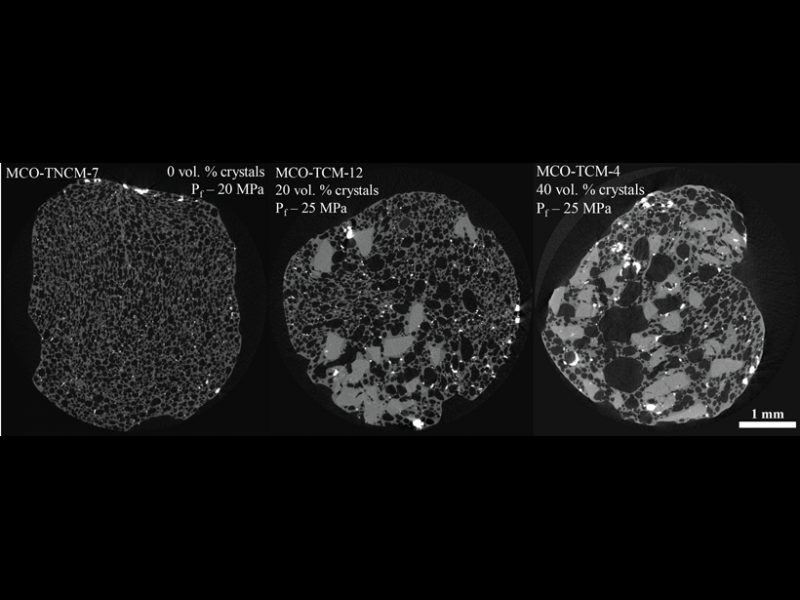Crystals Connect Bubbles in Explosive Magmas
Hydrous silica-rich magmas can degas through connected bubble pathways when as little as 20% crystals are present, influencing transitions from explosive, Vulcanian-style eruptions to lava effusion.
SOURCE: Geophysical Research Letters

X-ray tomography images of experimental magmas captured at different crystal contents (courtesy of the University of Texas High-Resolution X-Ray Computed Tomography Facility). Greyscale contrast shows how increasing crystal content (light grey and white shades) increases coalescence of bubbles (vesicles, black) in the magma (light grey, here quenched to glass). Credit: deGraffenried et al. [2019], Figure 2a
Volcanic eruptions of hydrous and silica-rich (intermediate-felsic) magmas can cycle between Vulcanian-style explosions, lava dome extrusions, and dome collapse. The processes through which magmas degas during ascent depend on many factors, but the connectivity of bubble pathways ultimately controls how rapidly pressurized gas escapes. The critical threshold of gas permeability (the percolation threshold) in ascending intermediate to felsic magmas can be influenced by mineral crystallization.
Through laboratory experiments on crystal-bearing synthetic magmas, deGraffenried et al. [2019] show that at as little as 20 per cent crystallization can reduce the percolation threshold to just over 50 per cent porosity of the magma volume, creating connected bubble pathways that enhance degassing. That lowered threshold likely plays an important role in transitions between effusive and explosive eruption styles in hydrous, crystal-bearing magmas.
Citation: deGraffenried, R. L., Larsen, J. F., Graham, N. A., & Cashman, K. V. [2019]. The influence of phenocrysts on degassing in crystal‐bearing magmas with rhyolitic groundmass melts. Geophysical Research Letters, 46. https://doi.org/10.1029/2018GL081822
—Steven Jacobsen, Editor, Geophysical Research Letters
AGU发布最新国外工作学习机会:
1. Two Funded PhD Opportunities in Seismology at Dalhousie University
Halifax (City), Nova Scotia
Department of Earth Sciences, Dalhousie University
2. Ph.D. opportunity in environmental biogeochemistry
Greensboro, North Carolina
UNC-Greensboro
https://findajob.agu.org/job/8009715/ph-d-opportunity-in-environmental-biogeochemistry/
3. Postdoc opportunity from Virginia Tech University in partnership with the U.S. Naval Observatory
Washington Dc Post Office, Washington D.C.
Virginia Tech University
4. Postdoc in climate and carbon cycle modeling, Institute of Atmospheric Physics, CAS
Beijing (CN)
LASG, Institute of Atmospheric Physics, Chinese Academy of Sciences



